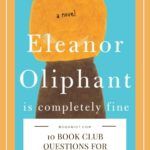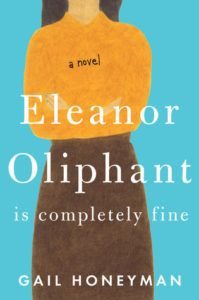It also heralded a whole new sub-genre of book across the pond: known as up lit, it encompasses books which showcase the better side of human nature and leave us feeling better and more hopeful about the world – a world which, pre-pandemic but post-Brexit and post-Trump, was otherwise looking pretty grim. In the U.S., too, the book has been popular: it spent 35 weeks on the New York Times Bestseller List. Its eponymous character, Eleanor Oliphant, is lonely, quirky, and arguably neurodivergent – and it’s the neurodiversity that makes her such an interesting and endearing character. If your book club is reading Eleanor Oliphant Is Completely Fine, here is a handy guide with a plot summary, themes, and suggested questions. Please note that from here on, there will be spoilers!
Eleanor Oliphant Is Completely Fine Summary
Eleanor Oliphant is 29 years old, single, and highly intelligent. She has no friends, unless you’re counting her meticulously planned daily routine and the two bottles of vodka she drinks at the weekends. Her carefully planned life begins to unravel when she leaves work one day with a colleague, Raymond, and they witness an older gentleman fall in the street. This sets in motion a friendship both with Raymond and with the older gentleman and his family. When Eleanor is absent from work, and, in fact, planning her suicide, Raymond is sent to investigate, and he helps her to get better by encouraging her to see a doctor and a counsellor, and giving her a cat to look after. She begins to heal, and we learn that the weekly conversations with her overbearing, manipulative mother were actually all imaginary. When Eleanor was 10, her mother burned the house down, killing herself and Eleanor’s sister – and the fallout from this is the source of her scars, much of her trauma, and many of her defence mechanisms. By the end of the book, her life includes warmth and friendship and the sense of belonging she has never really had.
Themes in Eleanor Oliphant Is Completely Fine
Although Eleanor Oliphant is atypical, her struggles are universal: she’s lonely and longs for friendship. She had a difficult relationship with her mother (okay, this is an understatement). She suppresses memory and numbs her pain with defence mechanisms. Finally, she finds healing in community and therapy, and purpose in caring for something else – in this case, a cat.
Eleanor Oliphant is Completely Fine Book Club Questions
Further Reading
Six Books to Read after Eleanor Oliphant is Completely Fine 13 Eleanor Oliphant Is Completely Fine Quotes That Will Please Any Introvert

